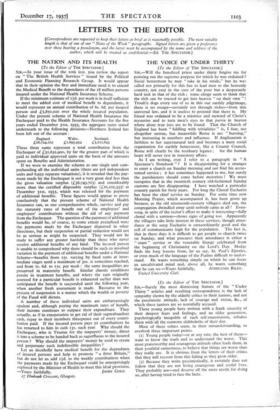LETTERS TO THE EDITOR
[Correspondents are requested to keep their letters as brief as is reasonably possible. The most suitable length is that of one of our " News of the Week" paragraphs. Signed letters are given a preference over those bearing a pseudonym, and the latter must be accompanied by the name and address of the author, which will be treated as con fidential.—Ed. THE SPECTATOR.]
THE NATION AND ITS HEALTH
[To the Editor of THE SPECTATOR.]
Snt,—In your issue of the zoth inst. you review the report on " The British Health Services " issued by the Political and Economic Planning Research Group. It would appear that in their opinion the first and immediate need is to extend the Medical Benefit to the dependants of the z8 million persons insured under the National Health Insurance Scheme.
If the minimum estimate of r id. per week is in itself sufficient to meet the added cost of medical benefit to dependants, it would represent an annual contribution of 6s. 6d. per insured person and £5,850,000 over the whole insured population. Under the present scheme of National Health Insurance the Exchequer paid to the Health Insurance Accounts for the five years ended December 31st, 1933, the aggregate sums stated underneath to the following divisions—Northern Ireland has been left out of the account : England. Wales. Scotland.
£26,724,102 £1,695,954 £3,212,843
These three sums represent a total contribution from the Exchequer of £31,632,900, by far the greater part of which is paid to individual approved units on the basis of the amounts spent on Benefits and Administration.
If we were to examine the scheme as one single unit com- prehending all the individual units (there are 916 independent units and 6,955 separate valuations), it is revealed that the pay- ment made by the Exchequer is not a very great deal less than the gross valuation surplus (£36,743,7o3) and considerably more than the certified disposable surplus (£2o,1o5,333) at December 31st, 1933, which was released for the payment of additional benefits. These figures would appear to prove conclusively that the present scheme of National Health Insurance can, as one comprehensive whole, survive and pay the statutory rates of benefit out of the employees' and employers' contributions without the aid of any payment from the Exchequer. The question of the payment of additional benefits would be, of course, to some extent prejudiced were the payments made by the Exchequer dispersed in other directions, but their suspension or partial reduction would not be as serious as might be suspected. They would not be made to suffer any greater hardship than those who never receive additional benefits of any kind. The insured person is unable to comprehend why there should be such an involved variation in the payment of additional benefits under a National Scheme—benefits from i5s. varying by fixed sums at inter- mediate stages until a maximum of 3os. is sometimes reached, and from 7s. 6d. to iss. per week : the same inequalities are preserved in maternity benefit. Similar chaotic conditions persist in treatment benefits, and where the sum originally assessed for a particular benefit is exhausted earlier than was anticipated the benefit is suspended until the following year, when another fresh assessment is made. Recourse to the process of suspension is a matter which the wealth or poverty of the Fund will dictate.
A number of these individual units are embarrassingly opulent and, although paying the maximum rates of benefit, their income continues to outpace their expenditure. They actually, as if in exasperation to get rid of their superabundant cash, repay to their members threepence out of every contri- bution paid. If the insured person pays 52 contributions he has returned to him in cash 13s. each year. Why should the Exchequer, who is Trustee for the taxpayers' money, direct it into a scheme to be handed back as superfluous to the insured person ? Why should the taxpayers' money be used to create and perpetuate such indefensible inequalities ?
Let us decidedly have medical benefit for the dependants of insured persons and help to promote " a fitter Britain," but do not let us add I id. to the weeldy contributions when the payments made by the Exchequer could be enterprisingly explored by the Minister of Health to meet this ideal provision.
—Yours faithfully, JAMES GOLD. 27 Elmbank Crescent, Glasgow.














































 Previous page
Previous page